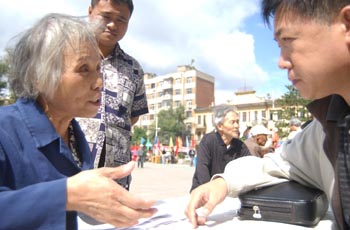| Tools: Save | Print | E-mail | Most Read |
| China Questions and Answers |
| Adjust font size: |
Q: In any country, there are disadvantaged people who can't afford to hire a lawyer. Has the Chinese Government established a legal aid system, and if so, what requirements must people meet to qualify for legal aid? A: The legal aid system is an important component of China's socialist legal system as well as a guarantee for a system of impartial justice. In early 1994, China's justice department officially established and implemented a legal aid system in order to safeguard the right of the disadvantaged to legal representation in spite of economic difficulties, ensuring justice and hence embodying the principle of equality before the law. In the past decade, China has tentatively established a set of legal aid solutions that accord with China's national conditions. The Criminal Procedure Law and the Lawyer Law, promulgated successively in March and May 1996, secured legal aid its due position in China's legal system. The two laws also established the principle of uniform procedure for legal aid, covering the process of application, examination and approval, case assignment and supervision. Since then, legal aid organizations have been established in connection with people's courts at the central, provincial, prefecture and county levels. Growing numbers of legal professionals are providing legal aid for a wide array of criminal, civil and administrative litigation as well as non-litigation matters. Government statistics show that by the end of 2004, a total of 3,023 legal aid organizations had been established nationwide and 294,138 people involved in 190,187 cases had received legal aid. At the same time, people from all walks of life were actively providing legal aid, including 2,700 legal aid centers and women's rights protection organizations founded by the All-China Women's Federation and its local branches, and 2,990 legal aid organizations for employees by the All-China Federation of Trade Unions and local branches. As well, the China Disabled Persons' Federation and its branches sought cooperation with law firms and have signed a legal aid agreement with more than 3,000 law firms to help the disabled protect their rights. About 30 institutions of higher learning, including Peking University, Tsinghua University and Wuhan University, have made providing legal aid for disadvantaged people a curriculum goal. There are two main preconditions for a person seeking legal aid in China. First, the applicant must have sufficient evidence to prove that legitimate rights were violated and consequently they need legal help. Second, the person must prove that they can't afford a lawyer. Local governments usually have their own basic standards when assessing whether an applicant can or can't afford a lawyer, due to uneven economic development across China. The Chinese people have welcomed the implementation of a legal aid system, and an increasing number of government departments have attached importance to the establishment of their own legal aid systems. Currently, the Central Government finances the daily operation of legal aid centers, as do local governments at provincial, prefecture and county levels. As the economy and society develop, the legal aid system will cover more and more fields in China. The ultimate goal of China's legal aid system is to guarantee high quality legal representation to any Chinese citizen who meets the requirements for help.
|
| Tools: Save | Print | E-mail | Most Read |
 |
| Related Stories |
|
Product Directory China Search |
Country Search Hot Buys |
